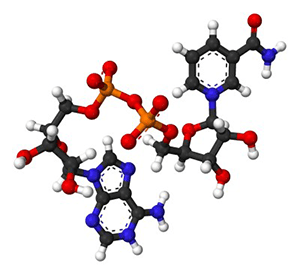[vc_row][vc_column][vc_column_text]
Intravenous Administration of Nicotinamide Adenine Dinucleotide Significantly Reduces Self Report Craving Ratings Associated With Opiate and Alcohol Withdrawal*
[/vc_column_text][vc_column_text]
Craving Study Introduction
 Treatment of substance abuse disorders continues to challenge clinicians, and “cravings” for the abused substance are often impediments to sobriety (the “rehab/relapse cycle”). However, Nicotinamide Adenine Dinucleotide (NAD+) has demonstrated anti-craving properties, and previous data from this clinic support the use of NAD+ as a valid treatment for drug cravings. This pilot study retrospectively examined the anti-craving properties of NAD+ in a group of 60 patients. Additionally, patients were assessed on severity of cravings and relapse episodes at 12-20 months post treatment.[/vc_column_text][/vc_column][/vc_row][vc_row][vc_column][vc_row_inner][vc_column_inner width=”1/2″][vc_single_image image=”465″ img_size=”full” alignment=”center”][/vc_column_inner][vc_column_inner width=”1/2″][vc_single_image image=”466″ img_size=”full” alignment=”center”][/vc_column_inner][/vc_row_inner][vc_row_inner][vc_column_inner width=”1/2″][vc_single_image image=”464″ img_size=”full” alignment=”center”][/vc_column_inner][vc_column_inner width=”1/2″][vc_single_image image=”467″ img_size=”full” alignment=”center”][/vc_column_inner][/vc_row_inner][/vc_column][/vc_row][vc_row][vc_column][vc_column_text]
Treatment of substance abuse disorders continues to challenge clinicians, and “cravings” for the abused substance are often impediments to sobriety (the “rehab/relapse cycle”). However, Nicotinamide Adenine Dinucleotide (NAD+) has demonstrated anti-craving properties, and previous data from this clinic support the use of NAD+ as a valid treatment for drug cravings. This pilot study retrospectively examined the anti-craving properties of NAD+ in a group of 60 patients. Additionally, patients were assessed on severity of cravings and relapse episodes at 12-20 months post treatment.[/vc_column_text][/vc_column][/vc_row][vc_row][vc_column][vc_row_inner][vc_column_inner width=”1/2″][vc_single_image image=”465″ img_size=”full” alignment=”center”][/vc_column_inner][vc_column_inner width=”1/2″][vc_single_image image=”466″ img_size=”full” alignment=”center”][/vc_column_inner][/vc_row_inner][vc_row_inner][vc_column_inner width=”1/2″][vc_single_image image=”464″ img_size=”full” alignment=”center”][/vc_column_inner][vc_column_inner width=”1/2″][vc_single_image image=”467″ img_size=”full” alignment=”center”][/vc_column_inner][/vc_row_inner][/vc_column][/vc_row][vc_row][vc_column][vc_column_text]
Method
The patients were adult males and females with addictions to primarily opiates or alcohol (N=60). (Six patients had incomplete data.) The treatment, Brain Restoration Plus (BR+) consisted of IV infusions of NAD+ along with vitamins, oral amino acids, NAC and variable PRN medications for an average of 10 consecutive days ranging from 5 to 10 hours daily at a dose range of 500mg-1500mg each day. Self-reported craving ratings (0-10 Scale) came in on Day 1 (before starting treatment), Day 5, and on Day 10 (last day of treatment). Follow up phone surveys were also conducted from 12-20 months post treatment (N= 27). Patients reported severity of cravings (1-5) and number of relapse episodes at the present time.
Conclusion
NAD+ is an effective detox treatment for alcohol as well as opiate addicts as evidenced by a significant reduction in craving ratings. On top of this, NAD+ was effective in reducing and maintaining the number of relapse episodes, as well as severity of drug cravings. NAD+ shows potential as a long-term therapy in maintaining sobriety through minimizing drug cravings and also preventing relapse.[/vc_column_text][/vc_column][/vc_row][vc_row type=”vc_default” bg_type=”bg_color” bg_color_value=”#e8e8e8″ css=”.vc_custom_1566321998976{padding-top: 30px !important;padding-right: 30px !important;padding-bottom: 30px !important;padding-left: 30px !important;}”][vc_column][vc_column_text]* S. L. BROOM1, R. MESTAYER2, E. STULLER3, D. COOK4, J. CARSON2, K. SIMONE2, P. NORRIS2, P. HOTARD21 Dept Psychol, William Carey Univ., Hattiesburg, MS; 2Springfield Wellness Center, Springfield, LA; 3Stullerresettings, LLC; 4ABAM.SoberMD,LLC Acknowledgements: Thank you to Springfield Wellness Center for providing patient data. Thank you to William Carey University for providing a Professional Development Grant in support of this project.[/vc_column_text][/vc_column][/vc_row]
